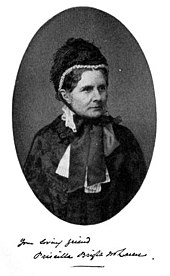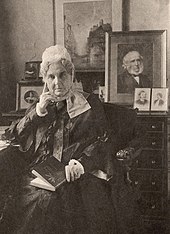Priscilla Bright McLaren
Priscilla Bright McLaren (born September 8, 1815 in Rochdale , Lancashire - died November 5, 1906 in Edinburgh ) was a British activist who was active in the anti-slavery movement and linked it with the women's suffrage movement in the 19th century . She was a member of the "Edinburgh Ladies' Emancipation Society" and, after serving as a board member, became the President of the "Edinburgh Women's Suffrage Society".
Life
She was born Priscilla Bright in Rochdale, Lancashire. She came from a Quaker family who believed in the education of their female members. Her father, Jacob Bright, had worked his way up from weaving to being an accountant to becoming a wealthy cotton manufacturer. His political views remained radical and he passed on his activism to his children. Her mother Martha took an equal part in her husband's business and founded “Essay Societies” and “Debating Clubs” for their children. These audience-related skills were later well implemented by their daughters Margaret and Priscilla, and also used by the most famous of the Bright sons, radical House of Commons John Bright .
Priscilla ran the household for her brother John and also looked after her niece, Helen Bright Clark . She believed that she had missed her own chance to have a family; but when John remarried, Priscilla accepted a suitor's proposal that she had already turned down twice. Duncan McLaren was a doubly widowed Edinburgh merchant. He was considerably older than Priscilla, who would become the stepmother of his five children. As a punishment for accepting the third request, Priscilla was expelled from the Society of Friends (that's what the Quakers call themselves). For the most part, she didn't care because she continued to attend Quaker meetings.
Duncan built a political career on, first as "Alderman" ( Alderman or Councilor), then as "Lord Provost" (mayor or head) and finally as a Liberal member of Parliament in 1865. They worked together on many campaigns, what many Contemporaries described as "equal partnership". They had three other children together and lived together at Newington House.
When the Ladies' Emancipation Society was dissolved, Eliza Wigham , Jane Smeal and some of their friends formed the Edinburgh subgroup of the National Society of Women's Suffrage . Eliza Wigham and McLaren's stepdaughter Agnes McLaren became the secretaries. Priscilla McLaren was the President and Elizabeth Pease Nichol was the Treasurer. McLaren died in Edinburgh on November 5, 1906, shortly after she wrote to support the suffragettes who were jailed for their militancy . She was buried next to her husband in St Cuthbert's Kirkyard, Edinburgh.
Heritage and Appreciation
- Four women closely associated with Edinburgh were the subject of a campaign by Edinburgh historians. The group intended to bring public recognition to Priscilla Bright McLaren, Elizabeth Pease Nichol , Eliza Wigham and Jane Smeal - the city's "forgotten heroines".
- Her name and picture (and those of 58 other supporters of women's suffrage) are engraved on the base of the Millicent Fawcett statue in Parliament Square , London, which was unveiled in late 2018.
Individual evidence
- ^ Clare Midgley: Women Against Slavery. Routledge, p. 173. ISBN 0415127084
- ^ Sandra Stanley Holton: Quaker Women. Routledge. ISBN 9780415281447
- ↑ Holton, p.
- ^ National Society of Women's Suffrage. Examiner; Jan 14 1871; 3285; British Periodicals, p. 55
- ^ Edward H. Milligan: McLaren, Priscilla Bright (1815-1906) , In: Oxford Dictionary of National Biography , Oxford University Press, 2004. See also: Retrieved April 20, 2019
- ↑ Campaign to honor four 'forgotten' heroines of Scottish history , The Herald (Glasgow), June 2, 2015. Retrieved April 20, 2019
- ↑ Historic statue of suffragist leader Millicent Fawcett unveiled in Parliament Square . Gov.uk. April 24, 2018. Retrieved April 24, 2018.
- ↑ Alexandra Topping: First statue of a woman in Parliament Square unveiled . In: The Guardian , April 24, 2018.
- ↑ Millicent Fawcett statue unveiling: the women and men whose names will be on the plinth . iNews. Retrieved April 25, 2018.
| personal data | |
|---|---|
| SURNAME | Bright McLaren, Priscilla |
| BRIEF DESCRIPTION | English suffragette and abolitionist |
| DATE OF BIRTH | September 8, 1815 |
| PLACE OF BIRTH | Rochdale , Lancashire, UK |
| DATE OF DEATH | 5th November 1906 |
| Place of death | Edinburgh |

